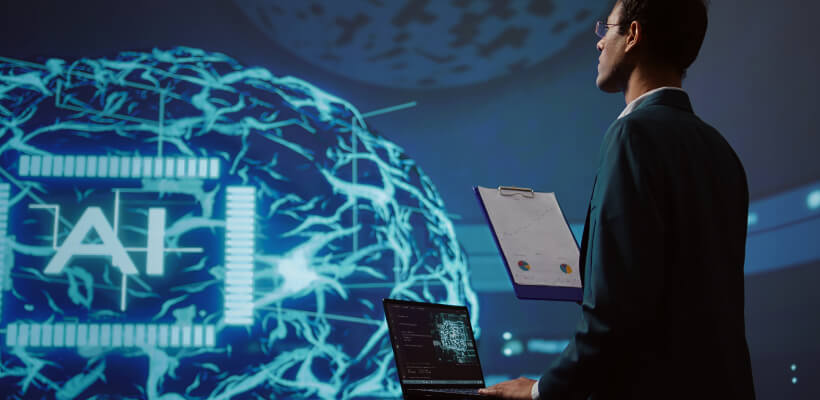 1-800-805-5783
1-800-805-5783 
Unlike traditional AI systems that require explicit instructions for each task, Agentic AI embodies autonomy, adaptability, and proactive decision-making. These intelligent agents can understand context, set goals, and execute complex functions without constant human oversight. This transformative capability is redefining how businesses approach automation, leading to unprecedented efficiencies and innovations across industries.
The adoption of Agentic AI is accelerating, with substantial market growth projected in the coming years. Agentic AI in the business automation market is expected to grow from USD 1.45 billion in 2024 to USD 47.68 billion by 2034 with a CAGR of 41.8%.
Agentic AI refers to AI systems designed with agency—the capacity to act independently, make decisions, and adapt to changing environments. These agents are not limited to predefined scripts; they can interpret context, learn from interactions, and adjust their behavior to achieve desired outcomes. These systems are programmed so that they transparently don’t take simple instructions but take on the goals of the agent.

Fundamentally, Agentic AI incorporates several capabilities:
In this initial stage, the AI agent gathers data from various sources to understand its environment. This includes processing inputs such as text, images, audio, and sensor data. The goal is to build a comprehensive situational awareness that informs subsequent reasoning and actions.
After perceiving the environment, the AI agent analyzes the information to make informed decisions. This involves interpreting data, understanding context, and determining the best action to achieve specific goals. Reasoning allows the agent to plan and prioritize tasks effectively.
In the action phase, the AI agent executes the decisions made during the reasoning stage. This could involve communicating with users, manipulating digital interfaces, or controlling physical devices. The actions are aimed at fulfilling the agent’s objectives based on its understanding of the environment.
Learning is the process by which the AI agent updates its knowledge base and improves future performance. By analyzing the outcomes of its actions, the agent identifies successes and areas for improvement, refining its models and strategies accordingly.
Agentic AI enhances supply chain efficiency by autonomously monitoring inventory levels, predicting demand, and coordinating logistics. For instance, companies like Walmart have utilized AI-driven demand planning to reduce excess inventory and improve stock alignment during peak shopping.
In healthcare, agentic AI serves as a virtual assistant, analyzing patient data to provide personalized health recommendations. For example, AI-powered virtual assistants improve patient interaction and expedite administrative duties, enhancing patient experience.
Agentic AI optimizes manufacturing and logistics by enabling predictive maintenance, efficient supply chain management, and autonomous decision-making. AI agents can anticipate equipment failures, optimize delivery routes, and manage inventory levels, resulting in cost savings and improved operational efficiency.

Financial institutions employ agentic AI to bolster cybersecurity measures. These agents continuously scan network activity, identify anomalies, and initiate automated responses to potential threats. For instance, agentic AI can function as an autonomous decision-maker for security operations, taking proactive actions, automating software development processes, or automating penetration testing.
As Agentic AI evolves, its integration into business processes will become increasingly sophisticated. The focus will shift towards developing agents capable of handling more abstract tasks, exhibiting higher levels of reasoning, and collaborating seamlessly with human counterparts. This progression will unlock new possibilities for innovation, efficiency, and competitive advantage in the business landscape.
While Generative AI focuses on creating content like text, images, or code, Agentic AI refers to systems that can independently evaluate situations, make decisions, and execute actions to fulfill specific objectives without human intervention. It combines perception, reasoning, and action to operate independently in dynamic environments.
Agentic AI represents a significant advancement over traditional AI by introducing autonomy, adaptability, and proactive decision-making capabilities. While traditional AI systems operate based on predefined rules and require human oversight for each task, Agentic AI systems can set goals, make decisions, and execute complex functions without constant human intervention.
Yes, Agentic AI can be integrated into existing workflows. However, successful integration often requires assessing current processes, ensuring data quality, and reengineering specific workflows to accommodate autonomous decision-making.
Implementing Agentic AI necessitates robust security measures, including:
Agentic AI systems are designed with learning capabilities to adapt to new or unexpected scenarios. They utilize feedback loops to learn from outcomes, allowing them to adjust their behavior over time. However, the extent of adaptability depends on the system’s design and the quality of data it receives.
Agentic AI is making substantial impacts across various industries:
At [x]cube LABS, we craft intelligent AI agents that seamlessly integrate with your systems, enhancing efficiency and innovation:
Integrate our Agentic AI solutions to automate tasks, derive actionable insights, and deliver superior customer experiences effortlessly within your existing workflows.
For more information and to schedule a FREE demo, check out all our ready-to-deploy agents here.